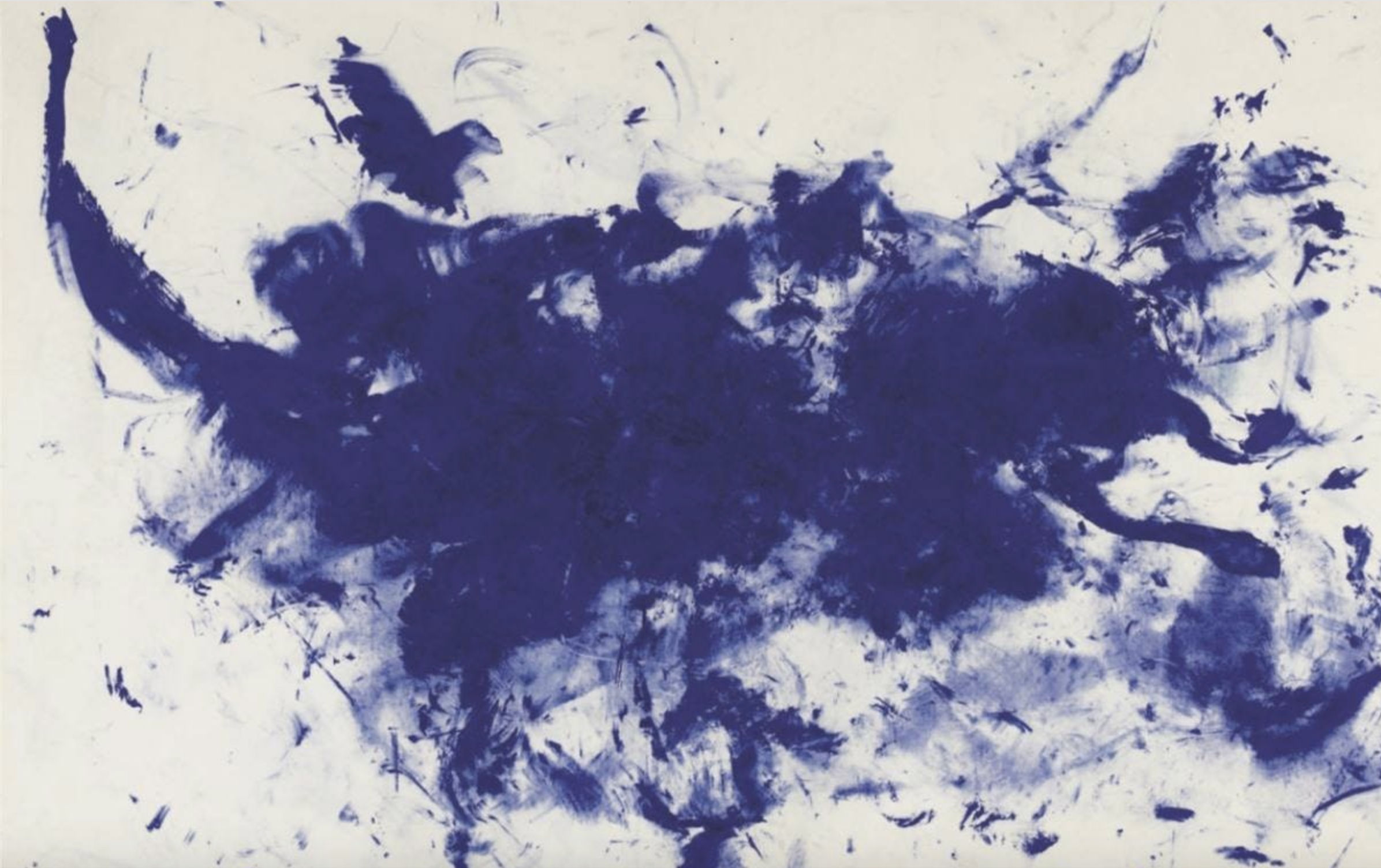
Yves Klein. Anthropometry. 1960-61.
Blue is the color of Gauloise cigarettes and Tiffany boxes, of dungarees, democrats, and the earth from space. It represents fidelity (true blue) and purity (blue blood); value (blue ribbon) and rarity (once in a blue moon). The color of the sky and the sea (and according to Kandinsky, the soul), it embraces the melancholy (having the blues) as well as the musical (singing the blues!) and has inspired generations of philosophers, poets, and artists. A royal color in the twelfth century and a romantic color in the twentieth, Goethe wrote about it, and so did William Gass; Alexander Theroux commits one third of a volume to the color blue, and Picasso devoted three years to it, when, following a friend’s suicide, the world suddenly looked very different.
For many years, I taught a class at Yale all about blue, in which students explored its rich and varied history. We looked at cultural references in the Langston Hughes papers, met with an ornithologist to learn about bird feathers, and consulted with a singer-songwriter who taught the students, on blue harmonicas, how to find the blue note, that scant fissure of space between the major and minor scales. We studied metaphors, mythology, and what I like to call visual meteorology, and finally, pored through a range of pharmaceutical ephemera at the medical school, trying to determine what might have been the earliest reference to having the blues.
It might well have been Chaucer who, back in 1385, showed that blue just meant sad.
Later, Goethe, among others, would concur. The appearance of objects seen through a blue glass is gloomy and melancholy, he wrote. Kurt Vonnegut’s 1973 novel Breakfast of Champions was originally called Goodbye, Blue Monday. (Blue Monday was, incidentally, the original title for Ira Gershwin’s Rhapsody in Blue.)
The classic genre of the blues poem is about resilience in the face of hardship. Sound familiar? Five months into COVID-19 quarantines, with death tolls rising, fires raging, and two back-to-back hurricanes in less than a week, we have good reason to be blue, a word that has become synonymous not only with sadness—but more recently, with a particular kind of social ennui. There’s something a bit unsettling about this trend, journalists—from Wired to Salon to the newspaper of record itself—writing about pandemic-led boredom, a word which, it turns out, did not even exist until a century ago.
Does blue = bored? Or might there be another way to look at this?
Consider, for starters, Maggie Nelson’s Bluets —a lyrical love letter to the color blue.
Or Joni Mitchell’s Turbulent Indigo. Or Duke Ellington’s Live at The Blue Note.
There is Andy Warhol’s Blue Movie (1969), David Lynch’s Blue Velvet (1986), and Derek Jarman’s gut-wrenchingly beautiful Blue (1993) which was his last film, when, as he was becoming gradually blind, he saw only shades of blue.
There is pure color in Yves Klein, and pure soul in Kandinsky and The Blue Riders.
Partisan politics got you down? Listen to David Kastan’s reflections on democratic blue. (His magnificent book on color is here.) Kastan, by the way, is quoted in a recent essay by Katy Kelleher in The Paris Review, who writes with keen insight about, of all things, periwinkle.
An invasive species can also be curative, she writes, for a landscape and its people.
Curative! Invasive!
What she’s really writing about here is perception: our capacity to shift perspective and see anew.
So, this is where we are.
The fires persist. So do the hurricanes. (And the Republicans, whose convention website sported an unsettlingly blue background).Time to remember the healing properties of a luminous sky.
Time to reassert resilience in the face of hardship.
Time to consider that what is invasive might also be curative.
In these last and most fragile days of summer, encumbered as we are by so many punitive restrictions, how extraordinary that the light can beckon with so much promise.
635 years ago, even Chaucer knew that.
Moderate your sharp sorrow, he wrote, for the time will soon arrive when your happiness will return.

